News and Multimedia Featuring DTR
-
 Dr. Sarah Hollingsworth Lisanby to Depart NIMH• Institute Update
Dr. Sarah Hollingsworth Lisanby to Depart NIMH• Institute UpdateSarah Hollingsworth “Holly” Lisanby, M.D., Director of the Division of Translational Research, will depart NIMH this spring to join Arizona State University.
-
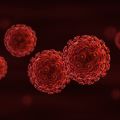 Researchers Investigate Potential Treatment for Eliminating HIV from the Brain• Research Highlight
Researchers Investigate Potential Treatment for Eliminating HIV from the Brain• Research HighlightIn a recent NIMH-funded study, researchers explored a potential new way of clearing HIV from the brain by testing a drug that targets a type of immune cell known as macrophages.
-
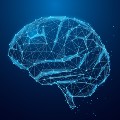 Brain Connectivity Linked With Cognition in People With Early Psychosis• Research Highlight
Brain Connectivity Linked With Cognition in People With Early Psychosis• Research HighlightAn NIMH-funded study identified consistent links between brain connectivity and cognitive function in people with early stage psychosis and people at high risk who later developed psychosis.
-
 Digital Autism Screening Tool Could Enhance Early Identification• Research Highlight
Digital Autism Screening Tool Could Enhance Early Identification• Research HighlightA tablet-based screening tool that analyzes children’s behavior in response to specific video clips shows promise for enhancing early autism screening, according to a study supported by NIMH.
-
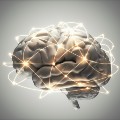 Noninvasively Stimulating Deep Brain Areas to Treat Depression Symptoms• Research Highlight
Noninvasively Stimulating Deep Brain Areas to Treat Depression Symptoms• Research HighlightIn a new neuroimaging study funded by the National Institute of Mental Health, researchers used repetitive transcranial magnetic stimulation to target regions deep in the brain to help reduce depression symptoms.
-
 Characterizing Childhood Irritability Across Ages and Stages• Research Highlight
Characterizing Childhood Irritability Across Ages and Stages• Research HighlightNIMH-supported research captures expressions of irritability across developmental stages via a clinically relevant measurement tool: the MAPS Temper Loss Scale.
-
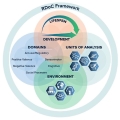 Revolutionizing the Study of Mental Disorders• Feature Story
Revolutionizing the Study of Mental Disorders• Feature StoryThe Research Domain Criteria Initiative (RDoC) represented a new way to conceptualize the study of mental illnesses. In celebration of NIMH's 75th Anniversary, we reflect on the beginning and progress of this initiative.
-
 Study Reveals Potential Neural Marker for Social Impairment in Psychotic Disorders• Research Highlight
Study Reveals Potential Neural Marker for Social Impairment in Psychotic Disorders• Research HighlightResearch funded by NIMH found a link between a low level of social interest among people with psychotic disorders and brain regions in the social motivation system.
-
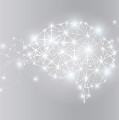 Using Games to Explore the Mind• Institute Update
Using Games to Explore the Mind• Institute UpdateThe National Institute of Mental Health (NIMH) and the non-profit organization The Many Brains Project partnered with the National Institutes of Health (NIH) All of Us Research Program to adapt a series of new game-like tasks that are now part of the All of Us Research Program’s participant experience.
-
 Combined, High Maternal Stress and Prenatal COVID-19 Infection May Affect Attention Span in Infants• Media Advisory
Combined, High Maternal Stress and Prenatal COVID-19 Infection May Affect Attention Span in Infants• Media AdvisoryPrenatal COVID-19 infection increased the risk for impaired attention and delayed socioemotional and cognitive functioning among infants of mothers who experienced high psychosocial stress during their pregnancy.
-
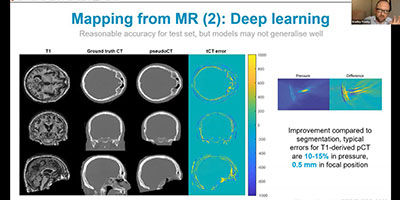 Workshop Day 2: Ultrasound Neuromodulation for Mental Health Applications• Video
Workshop Day 2: Ultrasound Neuromodulation for Mental Health Applications• VideoWorkshop Day 2: Ultrasound Neuromodulation for Mental Health Applications
-
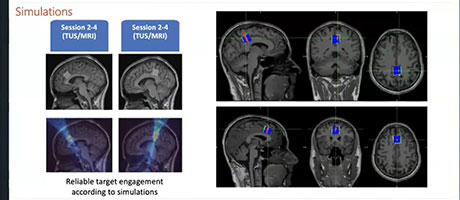 Workshop Day 1: Ultrasound Neuromodulation for Mental Health Applications• Video
Workshop Day 1: Ultrasound Neuromodulation for Mental Health Applications• VideoWorkshop Day 1: Ultrasound Neuromodulation for Mental Health Applications
-
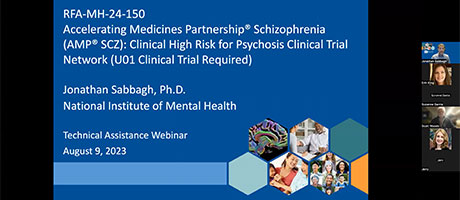 Technical Assistance Webinar: Accelerating Medicines Partnership® Schizophrenia (AMP® SCZ): Clinical High Risk for Psychosis Clinical Trial Network (U01 Clinical Trial Required)• Video
Technical Assistance Webinar: Accelerating Medicines Partnership® Schizophrenia (AMP® SCZ): Clinical High Risk for Psychosis Clinical Trial Network (U01 Clinical Trial Required)• VideoThis technical assistance webinar was for prospective applicants of the Notice of Funding Opportunity: Accelerating Medicines Partnership® Schizophrenia: Clinical High Risk for Psychosis Clinical Trial Network.
-
 Mothers' Difficult Childhoods Impact Their Children’s Mental Health• Research Highlight
Mothers' Difficult Childhoods Impact Their Children’s Mental Health• Research HighlightIn this NIMH-funded study, researchers examined how trauma gets passed from one generation to the next.
-
 Population Study Finds Depression Is Different Before, During, and After Pregnancy• Research Highlight
Population Study Finds Depression Is Different Before, During, and After Pregnancy• Research HighlightNew NIMH-funded research tracked population-level rates of postpartum depression among new mothers before, during, and after pregnancy.
-
 Infants’ Health Record Data May Improve Early Autism Screening• Research Highlight
Infants’ Health Record Data May Improve Early Autism Screening• Research HighlightResearch supported by NIMH suggests that children’s health records may yield some promising insights that could improve the accuracy of early autism screening.
-
 Attention to Geometric Images May Offer Biomarker for Some Toddlers with Autism• Research Highlight
Attention to Geometric Images May Offer Biomarker for Some Toddlers with Autism• Research HighlightAn NIMH-supported study shows that preference for geometric images may be robust enough to serve as a biomarker for identifying some young children with autism.
-
 COVID-19 Pandemic Associated With Worse Mental Health and Accelerated Brain Development in Adolescents• Research Highlight
COVID-19 Pandemic Associated With Worse Mental Health and Accelerated Brain Development in Adolescents• Research HighlightAn NIMH-supported study suggests that adolescents living through the COVID-19 pandemic may be experiencing more anxiety and depression symptoms and accelerated brain aging.
-
 Brief Cognitive Training May Extend the Antidepressant Effects of Ketamine• Research Highlight
Brief Cognitive Training May Extend the Antidepressant Effects of Ketamine• Research HighlightAn NIMH-supported study suggests that a brief self-association training program can extend the effects of a single ketamine infusion by shifting people’s negative self-beliefs.
-
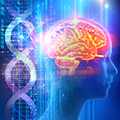 Researchers Map the Genetic Landscape of Schizophrenia in the Brain• Research Highlight
Researchers Map the Genetic Landscape of Schizophrenia in the Brain• Research HighlightIn a comprehensive postmortem genetic analysis of the caudate nucleus in the brain, NIMH-supported researchers identified many genes associated with schizophrenia risk, including a gene that regulates the flow of the chemical messenger dopamine.
-
 NIH Announces Winners of High School Mental Health Essay Contest• Institute Update
NIH Announces Winners of High School Mental Health Essay Contest• Institute UpdateThe National Institutes of Health (NIH) is pleased to announce the winners of 2022 Speaking Up About Mental Health! This Is My Story essay contest.
-
 NIH Awards $100 Million for Autism Centers of Excellence Program• Institute Update
NIH Awards $100 Million for Autism Centers of Excellence Program• Institute UpdateThe National Institutes of Health has awarded a total of $100 million over the next five years to support nine Autism Centers of Excellence. This endeavor funds large research projects to understand and develop interventions for autism spectrum disorder.
-
 Toddlers’ Responses to “Baby Talk” Linked to Social, Cognitive, Language Abilities• Research Highlight
Toddlers’ Responses to “Baby Talk” Linked to Social, Cognitive, Language Abilities• Research HighlightIn an NIMH-supported study, researchers found that toddlers respond to emotionally expressive speech in different ways, and these varied responses are linked with their social, linguistic, and cognitive abilities.
-
 Low Motivation for Social Bonding May Signal Behavior Problems in Early Childhood• Research Highlight
Low Motivation for Social Bonding May Signal Behavior Problems in Early Childhood• Research HighlightIn an NIMH-supported study, researchers found that low social affiliation—low motivation for social engagement and bonding—may be a precursor that identifies children as early as age 2 who are likely to develop callous-unemotional behaviors.
-
 Adult “Picky Eaters” Recall Helpful Parent Feeding Strategies• Research Highlight
Adult “Picky Eaters” Recall Helpful Parent Feeding Strategies• Research HighlightResearchers asked a group of self-identified adult “picky eaters” to reflect on their parents’ feeding strategies to better understand which strategies were helpful and which weren’t.
-
 Feelings of Detachment After Trauma May Signal Worse Mental Health Outcomes• Research Highlight
Feelings of Detachment After Trauma May Signal Worse Mental Health Outcomes• Research HighlightA new NIMH-supported study shows that experiencing persistent feelings of detachment following trauma is an early psychological and biological marker of worse mental health outcomes.
-
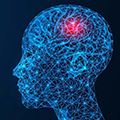 New Approach Allows Magnetic Brain Stimulation to Target Deep Brain Structures• Research Highlight
New Approach Allows Magnetic Brain Stimulation to Target Deep Brain Structures• Research HighlightTMS can only directly stimulate the outermost layer of the brain, but NIMH researchers have found that mapping a person’s brain architecture may make it possible to guide TMS to deep brain targets.
-
 Personalizing Deep Brain Stimulation for Treatment-Resistant Depression• Research Highlight
Personalizing Deep Brain Stimulation for Treatment-Resistant Depression• Research HighlightA recent NIMH-supported study investigated whether deep brain stimulation could be personalized for individuals with treatment-resistant depression.
-
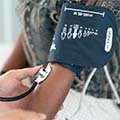 Women’s Experiences of Sexual Assault and Harassment Linked With High Blood Pressure• Press Release
Women’s Experiences of Sexual Assault and Harassment Linked With High Blood Pressure• Press ReleaseWomen who had ever experienced sexual violence in their lifetime—including sexual assault and workplace sexual harassment—were more likely to develop high blood pressure over a seven-year follow-up period, according to an NIH-funded study.
